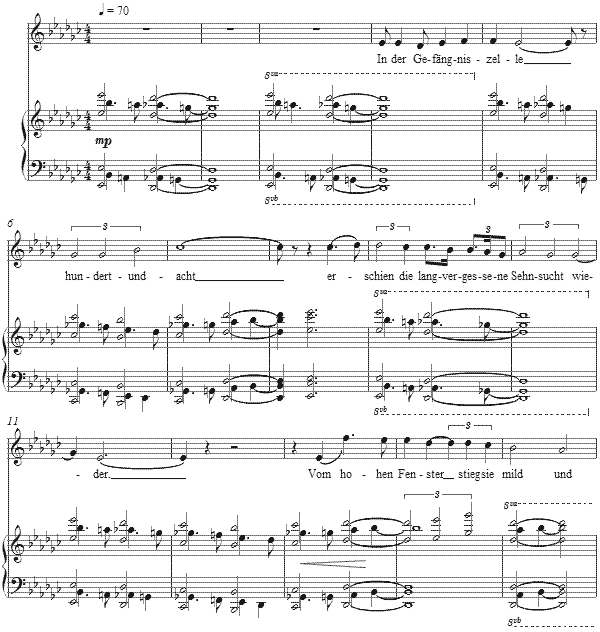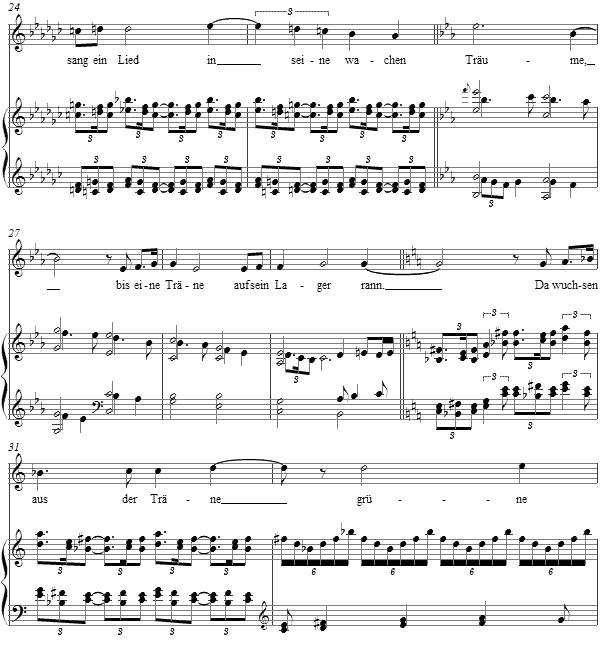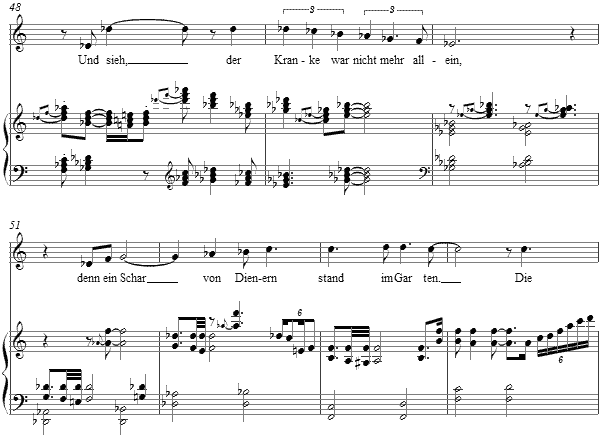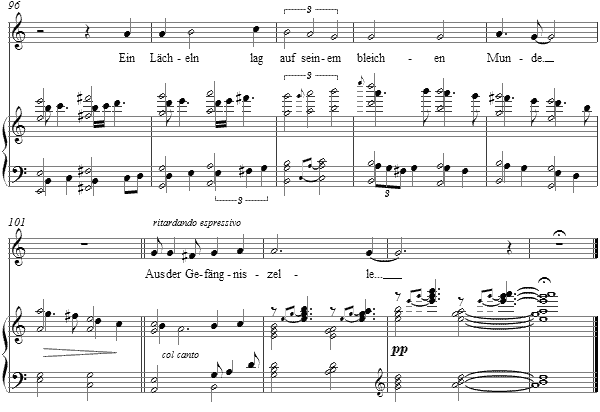Music and Texts of GARY BACHLUND
Vocal Music | Piano | Organ | Chamber Music | Orchestral | Articles and Commentary | Poems and Stories | Miscellany | FAQs
In Zelle 108 - (2009)
Joachim Ringelnatz
for medium voice and piano
In der Gefängniszelle 108
Erschien die langevergessene Sehnsucht wieder.
Vom hohen Fenster stieg sie mild und sacht
An einem schmalen Sonnenstrahl hernieder.
Sie grüßte einen müden, kranken Mann
Und sang ein Lied in seine wachen Träume,
Bis eine Träne auf sein Lager rann.
Da wuchsen aus der Träne grüne Baüme.
Und Wiesen, blütenbunt und sonnenhell,
Enstanden rings und hauchten zarte Düfte.
Durch frisches Grün sprang lustig wild ein Quell.
Ein Vogelschlag durchjubelte die Lüfte.
Und sieh, der Kranke war nicht mehr allein,
Denn eine Schar von Dienern stand in Garten.
Die riefen: "Herr, viel Gold und Glanz ist dein,
Sieh uns als Diener deinen Wunsch erwarten."
Der aber sprach und lächelte dabei:
"Nehmt Gold und Glanz und lebt damit zufrieden!
Ich habe keinen Wunsch, ich - - bin ja frei.
Geht hin! Euch sie dasselbe Los beschieden."
Aus der Gefängniszelle 108
Ward selben Tags in später Dämmerstunde
Ein toter alter Mann herausgrbracht.
Ein Lächeln lag auf seinem bleichen Munde.[ 7 pages, circa 6' 05" ]
Joachim Ringelnatz
In the prison cell, 108,
Appeared again the long-forgotten longing.
From a high window it entered soft and quiet
Down through a narrow stream of sunshine.
It greeted a weary, sickly man
And sang a song within his waking dreams,
Until a tear ran down his cheek.
There sprang out of the tear a green tree.
And fields, flower-colored and sunlight bright,
Rising around him and breathing out its breezes.
Through the fresh green sprang joyfully a fountain.
The rush of birds' wings rejoiced through the air.
And look! the sick one was no longer alone.
A crowd of servants stood in the garden.
They cried: "Sir, so much gold and splendor is yours,
And see us to await your every need."
But he spoke to them with a laugh:
"Take the gold and splendor and live with it in peace!
I have no wish, for I - - I am now free.
Go! Be content with this all.
From the prison cell, 108,
On the same day towards a later dusk
Was brought out a dead old man.
A smile lay on his pale mouth.
gb
The text is found in his collection simply titles Gedichte, 1910, rather early in Ringelnatz' career, with a number of other quite serious and earnest poems of great imagery and sensitivity. While Ringelnatz as clown is well known, he was also a painter and serious thinker, as this text demonstrates admirably. Sad to say, the text is prescient in many ways for his colleague, Erich Mühsam [ 1 ] met his death in a concentration camp, alongside so many other victims of national socialism, in the same year as Ringelnatz died after having been financially ruined by the Nazis.
The setting is for medium voice, rising several times to the top of the vocal range for an emphasis which underscores the height of the prison cell above the prisoner, as for his release from that prison by death. The setting is chromatic, and shifts tonal regions after setting the scene of the first stanza. The stark octaves with inner voices against outer, and octave displacements of gestures serve to darken the mode from the beginning as E flat minor sets this scene.
The waking dream takes the augmented, dotted triplets to settle a moment in E flat major as the antidote to the darker opening. Further shifts in chromaticism draw the tonal coloring away from the original tonic until it is fully obscured.
The reference to the "sick" one is for a moment mentioned with reference to the flat keys and regions of the opening but drawn immediately away to further harmonic distance as the scenic text paints its cast and surrounding in beautiful colorations.
The return to the opening structure as Ringelnatz' last stanza opens with the same sentiment is set a half step higher, a brighter albeit minor harmonic color from the darkness of E flat minor as a choral-like accompaniment underscores the scene of the body taken "out of the prison cell." And yet for the imagery of the poet's green treesand flower-colored fields, the final chords remain suspended and without a triadic resolution towards any particular tonic. Rather they whisper away unresolved.
The score for In Zelle 108 is available as a free PDF download, though any major commercial performance or recording of the work is prohibited without prior arrangement with the composer. Click on the graphic below for this piano-vocal score.
NOTES
[ 1 ] Of Mühsam, Ringelnatz wrote in a guestbook -- Gästebuch Carl Georg von Maassens (1920-1922) -- under the date 17 June 1921: "Erich Mühsam saß ganz heiter -- / Doch die Hochbahn führt uns weiter, / Über Pinneberg und Schweden, / Und zuletzt will man nur reden. /Reden, bis die Zunge krampt. / Dies und frohes Ruhesanft / Wünscht aus Neid und Kaffeesatz / Ringelnatz."
(Erich Mühsam sat quite pretty / as the overhead railway took us further / over Pinneberg and Sweden / and at last some will chatter / chatter till their tongue cramps up. / This and happy nattering / is wished out of envy and coffee grounds / Ringelnatz.)




